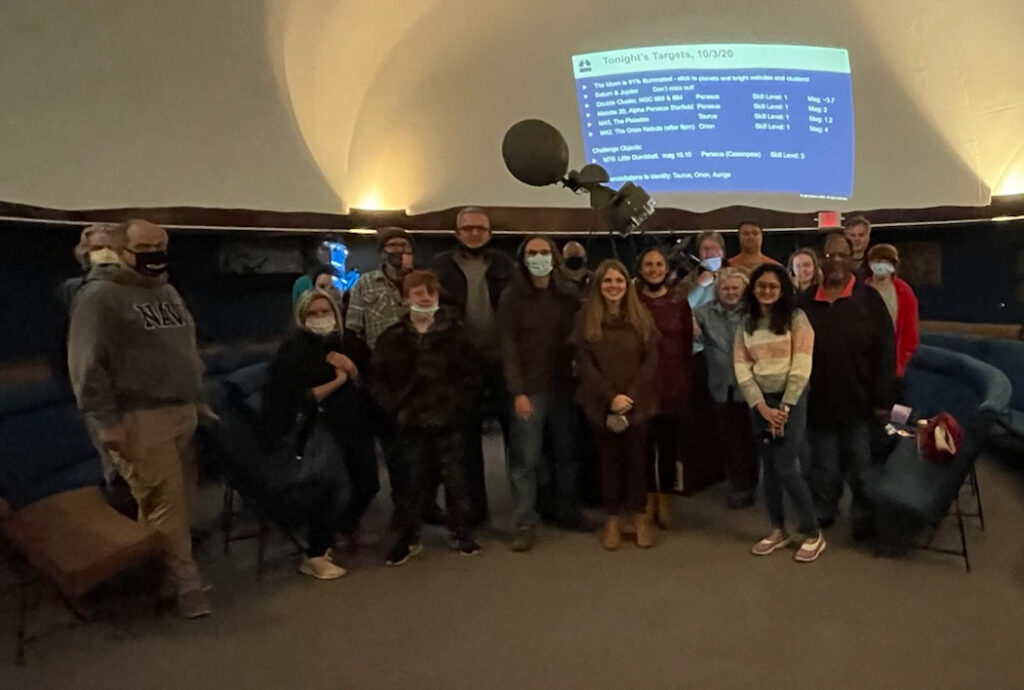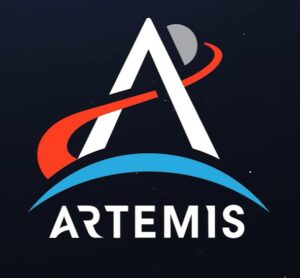Members of VBAS and Starry Skies South put together an article detailing Huntsville’s recent roll out of LED illumination. Read it here!
Author: admin
January 2023 Shows
All planetarium shows begin at 7:30pm. Admission opens at 7:00pm. Telescope viewing afterwards on clear nights.
January 7th – The Planetarium: A Magic Carpet
We can use the star projector in the planetarium to pretend to fly anywhere on Earth – like a magic carpet! Gena Crook will demonstrate the motion of the stars across the sky at the equator, the north pole, and the southern hemisphere. We will also watch how the sun changes positions at these locations. You may be surprised if you haven’t actually been to the equator or the north pole in person! This program will put the star projector to work and allow us to see its unique educational capabilities.
Presented by Gena.
January 14th – “So you got a telescope for Christmas”
A wide ranging discussion, about types of telescopes, and telescope accessories. Topics such as what
Presented by Frank
are the best (and cheapest) low power 1.25” or 2” eyepieces? What focal length eyepiece will give you
the best view for deep-sky objects? What eyepiece filters are the best for nebulae, or for planets?
What is atmospheric dispersion, and how can a $130.00 dispersion corrector result in much better views
of the planets.
January 21st – Wandering Stars
To the skywatchers of long ago, the bright stars that moved periodically among the fixed stars were known as the Wanderers. Today we know them as the planets. Right now you can see several bright planets in the night sky. Come and find out more about planet spotting and the various paths they follow.
Presented by Alex.
January 28th – Kids Night at the Planetarium
Bring your kiddos out for a night at the planetarium specifically for them. We will learn about the moon and try out some fun activities for the young (or young at heart).
Presented by Delisa.
December 2022 Shows
Star of Wonder
December 3rd, 10th at 7:30pm
On the evenings of December 3rd and December 10th VBAS will be hosting its special “Star of Wonder” planetarium show. This show is unique in that VBAS volunteers dress up as the 3 Wisemen and present the Christmas Story from a first century perspective. Be prepared to enter the world of 1st century Judea as the planetarium is filled with incense and songs of the season. The Wisemen’s story will include reading excerpts from the Bible of the Christmas Story and a scientific analysis of the potential causes of the star that guided them to Bethlehem. Of course, in the bags they carry the Wisemen will have treats for children in attendance. Be sure to arrive early as this show typically fills up quickly. We will have telescope viewing from our observing field following the show weather permitting.
Presented by Donald Reed, Jared Cassidy, and Tom Burleson
Star of Wonder
December 17th at 7:30pm
What exactly was the star that the Wisemen saw? Was it a star that stood in the sky two-thousand years ago and marked a single location in Bethlehem? Each year at this special time, VBAS turns back the hands of time to look into the sky of long ago and search for this mysterious object. As we ponder the skies of Bethlehem, we’ll explore several possibilities including comets, meteors, novae and other phenomena as well as examine the origins of some of the Christmas traditions we celebrate today.
Presented by Beth Bero
CLOSED for Winter Break
December 24th, 31st
2022 Telescope Buyer’s Guide
Choosing a first telescope for yourself or a loved one can be a daunting task. There is literally no limit to the amount of money that can be spent on telescopes and related equipment. Luckily, modern development of quality optics on simple, stable mounts and more recent advancements in low cost electronics and software means that the price of an entry level telescope can be quite affordable.
Each Fall, we update our Telescope Buyer’s Guide to help primarily first-time buyers seeking a telescope during the Holiday Season. Here’s our 2022 update:
November 2022 Members Meeting
Please join us at 7:30pm on November 18th for our monthly members meeting at VBAS!
Radio Astronomy from the Moon: A discussion on the science from upcoming CLPS missions to the lunar surface with low frequency radioastronomy instruments
We’re welcoming guest speaker Dr. Heidi Haviland, a planetary scientist at NASA’s Marshall Space Flight Center.
Heidi’s scientific research focuses on understanding planetary interiors using electromagnetic geophysical methods, neutron measurements, seismic normal modes, and the space plasma environment of airless bodies such as the Moon. She is the project scientist of the Neutron Measurements at the Lunar Surface (NMLS) instrument that will fly on Astrobotic’s Peregrine Mission one, and a science team member on the InSight mission. Heidi also leads an interdisciplinary research group focused on understanding the chemistry of the Moon through thermoelastic and petrological modeling. Heidi is the Project Scientist for the CLPS PRISM1a (CP-11) delivery which will investigate the Reiner Gamma surface swirl.
November 2022 Shows
Radio Observatories
November 5th, 12th at 7:30pm
We’ll be taking a look at radio telescopes of the past, present, and future. Radio telescopes have some very interesting designs and have made some extremely important discoveries. Radio Astronomy is even in VBAS’ near future. They’ll be opportunities for you to participate if you are interested.
Presented by Gena
Stars Fell on Alabama
November 19th at 7:30pm
The Leonid meteor shower occurs every year in mid-November. This year the peak will happen in the early morning of November 18th. Ms. Beth Bero will teach you how best to enjoy the meteors and where the meteors come from. This program is certain to be educational for the whole family.
Presented by Beth Bero
CLOSED for Thanksgiving!
November 26th
October 2022 Shows
Retrogrades, Oppositions and Conjunctions
Saturday, October 8, 7:30pm
Mercury must be retrograde. Mars is at opposition. There’s a conjunction of Jupiter and the Moon.
Phrases like these are often found in popular media and are used by astronomers to describe the relative positions of things in the sky. But what do those terms mean? We can use our star projector to help us see how the view from Earth is a little more complex than the view from space.
Presented by Alex Hall.
The Golden Record
Saturday, October 15, 7:30pm
We will be discussing the Voyager mission, and reviewing the contents and inscriptions on the Golden Record.
Presented by Maggie Stevens
Astronomy Day!
October 22nd
Spooky Skies
Saturday, October 29, 7:30pm
What was that light in the sky? Was it dangerous? A portent of evil? Come celebrate dark and spooky events in the sky with amateur astronomer Beth Bero at the planetarium. This program is NOT scary, so it is safe to bring the younger members of the family.
Presented by Beth Bero.
September 2022 Shows
Fall Skies
Saturdays, September 3 & 17, 7:30pm
Autumn is a wonderful time to relax under the night sky. Ms. Delisa Collette will inspire you to do just that. Constellations and other beautiful objects are awaiting your discovery. As an added bonus, Saturn will be an awesome spectacle in our society telescopes after the show on clear nights.
All About Stars
Saturday, September 10, 7:30pm
Twinkle, twinkle little star, how I wonder what you are? In this presentation, we’ll take a look at stars – big ones, small ones, explosive ones, sputtering ones, brand new ones, ancient ones, and ones that are long dead.
Presented by Alexandra Hall
The Planetarium: A Magic Carpet
Saturday, September 24, 7:30pm
We can use the star projector in the planetarium to pretend to fly anywhere on Earth – like a magic carpet! Gena Crook will demonstrate the motion of the stars across the sky at the equator, the north pole, and the southern hemisphere. We will also watch how the sun changes positions at these locations. You may be surprised if you haven’t actually been to the equator or the north pole in person! This program will put the star projector to work and allow us to see its unique educational capabilities.
Practical Astronomy Course – 2022
Class is full for 2022!
Instructor: Jeff Delmas, VBAS Observatory Director

Who Should Attend: The course is targeted to beginning observers, adults and teens, or those interested in a refresher course in basics observational astronomy.
Course Description
Learn the wonders of the night sky in a practical setting that involves both lecture and observing using your own telescope or binoculars. Whether you’ve purchased a telescope and want help learning your way around the night sky, are thinking about getting a telescope and want to learn about available equipment and techniques, or just want to learn, this class will help you in your quest. At the end of each lecture, students are provided a list of skill and season-appropriate targets to observe in the field and over the following week.
Updated for 2022! This year’s course has been modified to have more time in the observing field and less in lecture. In addition, we’ll start directly with learning the night sky, and telescope designs before later covering history and theory.
Tuesdays, 9/27/22 through 11/15/22, 7:00pm – 8:30pm
Eight sessions in total:
- Session 1: Navigating the Sky and Telescope Designs
- Session 2: Observing Progression
- Session 3: Charles Messier and His Catalog
- Session 4: References, Programs, and Apps to Guide Observing
- Session 5: Astronomy History & Basic Concepts
- Session 6: Modern Astrophotography
- Session 7: Radio Astronomy
- Session 8: Cosmology
Price: $25 members, $30 nonmembers
Each student must provide an email address so the instructor can provide course materials.
August 2022 Shows
Great Observatories of the World: Atacama Large Millimeter/submillimeter Array (ALMA)
Saturdays, August 6 and 20 7:30 pm
Truly great observatories are designed and built to see things never possible before. You probably have never heard of ALMA, the Atacama Large Millimeter/submillimeter Array, but it is making amazing discoveries nearly every day. ALMA looks at light we can’t see with our eyes, light in between the infrared spectrum and radio waves. This millimeter and submillimeter light from space has never been explored at the level ALMA is delivering. As a great observatory, ALMA is challenging scientists to ask new and better questions about the origins of galaxies, stars, and planets, but is also showing the incredible power and beauty of the universe around us. This show will explain how ALMA works and take you on a whirlwind tour of stellar nurseries, protoplanetary disks, and other mind-blowing discoveries made by ALMA.
Presented by Eric Silkowski
NASA’s Artemis Program

Saturday, August 13 at 7:30pm
Through the Artemis Program NASA aims to send first woman and next man to the Moon and achieve sustainable human presence on the Moon and Beyond. A series of Space Launch System (SLS) missions will enable reaching this goal. NASA has set the launch date for the first SLS launch to be August 29th. Rocket City played a very important role in reaching this milestone. Join us to learn about the Artemis program and celebrate this important milestone.
Presented by Dr. Naveen Vetcha.
High Mountain Observatories
Saturday, August 27 7:30 pm
Presented by Tom Burleson
